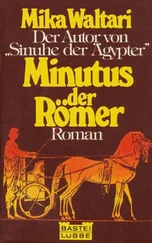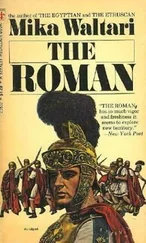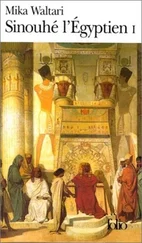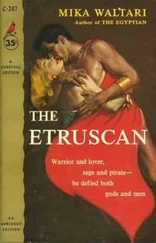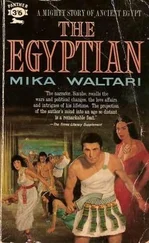Mika Waltari - The Wanderer
Здесь есть возможность читать онлайн «Mika Waltari - The Wanderer» весь текст электронной книги совершенно бесплатно (целиком полную версию без сокращений). В некоторых случаях можно слушать аудио, скачать через торрент в формате fb2 и присутствует краткое содержание. Жанр: Историческая проза, на английском языке. Описание произведения, (предисловие) а так же отзывы посетителей доступны на портале библиотеки ЛибКат.
- Название:The Wanderer
- Автор:
- Жанр:
- Год:неизвестен
- ISBN:нет данных
- Рейтинг книги:3 / 5. Голосов: 1
-
Избранное:Добавить в избранное
- Отзывы:
-
Ваша оценка:
- 60
- 1
- 2
- 3
- 4
- 5
The Wanderer: краткое содержание, описание и аннотация
Предлагаем к чтению аннотацию, описание, краткое содержание или предисловие (зависит от того, что написал сам автор книги «The Wanderer»). Если вы не нашли необходимую информацию о книге — напишите в комментариях, мы постараемся отыскать её.
The Wanderer — читать онлайн бесплатно полную книгу (весь текст) целиком
Ниже представлен текст книги, разбитый по страницам. Система сохранения места последней прочитанной страницы, позволяет с удобством читать онлайн бесплатно книгу «The Wanderer», без необходимости каждый раз заново искать на чём Вы остановились. Поставьте закладку, и сможете в любой момент перейти на страницу, на которой закончили чтение.
Интервал:
Закладка:
When the grave was dug and lined with the costly rugs and silks from the hay wagon, I took my lord Ibrahim’s body in my arms and laid him down for his last sleep, with his face toward the Holy City and his right hand under his cheek, that all requirements for a decent burial might be fulfilled. We then quickly filled in the grave, and to my delight the fragrance of musk floated up through the soil. Here on the mound I planted a young plane tree. Such trees live to be many hundreds of years old, and I hoped that this one would stand as a memorial to the Grand Vizier long after the capricious dervishes had abandoned the place.
With this I felt that my task was fully accomplished. I therefore took a tender leave of Murad-to7‹?£, thanking him for his friendship and calling down many blessings upon his head. My deaf-mute slave, who had followed the procession as inconspicuously as possible so as not to bring shame and ridicule upon it by his appearance, now approached and signed to me to hasten home. I began to suspect that his fellow mutes were awaiting me there, and turning to Andy I said, “Dear brother Andy, you must stay here among the dervishes and under the protection of the pious Murad -tseleb. This is my express order. Remember what I said to you last night. From now on your presence would be more trouble to me than it’s worth.”
Only such cold words as these could have kept him away from me and from danger. Crimson in the face he replied, “You could have taken leave of me in a kindlier way than that. But you were always headstrong, and I have always forgiven you your harshness. Go in peace, then, before I start to howl.”
When I came home, the janissaries still in attendance, it was not yet midday. The house was empty and silent and the slaves had fled. Only the Indian who tended the fish sat cross legged by the pool, seemingly plunged in meditation. I walked quietly upstairs and to my astonishment found Mirmah busily engaged in pouring ink over page after page of my half-finished translation of the Koran. My most precious books she had torn in pieces so that the floor was white with their leaves. She started when she saw me, then put her hands behind her and stared at me in defiance. I had never struck her, and perhaps she thought I would not do so now. I asked, “Why have you done this, Mirmah? I don’t think I ever did you any harm.”
She stared at me with a strange leer. Then, unable to contain herself any longer, she screamed with laughter and cried, “Down on the landing stage you’ll find a present that someone has thrown to you. That’s why everyone has run away. Go down and look.”
Full of forebodings I hurried down to the quay with the delighted Mirmah at my heels. But the janissaries had already found the body and the onbash was just turning the head with his foot to see the face. The body was naked, and so completely covered with blood that I thought at first the flayed carcass of an animal lay before me on the ground. The face was hard to recognize, as ears and nose had been cut away, the eyes put out, and the tongue gone from the gaping mouth. I had seen much in my life but never so gruesome and appalling a sight as this. I have no wish to describe all that had been done to the body. It would serve no purpose but to chase sleep from my eyes, though some years have passed since it happened. Nevertheless I summoned up all my resolution and bent down, and bit by bit I seemed to recognize familiar lines in that mutilated face. I noted the henna color of those soft hands and their well-cared-for, polished nails. My heart stood still and the blood turned to ice in my veins, for I saw that this was Mustafa ben-Nakir returned from his visit to the Seraglio. The eunuchs of the harem had thrown him on to my landing stage, having dealt with him as with all who are caught in the forbidden rooms.
Mirmah bent down, stuck her finger in Mustafa ben-Nakir’s mouth and felt his pearly teeth. I snatched her up, thrust her into the arms of the onbash, and ordered him to take her out of my sight. Mirmah shrieked, scratched, and kicked, but the men took her away by force and locked her into Giulia’s room. For a time she screamed and kicked at the door and smashed her mother’s valuable ornaments to pieces; then I think she fell asleep on Giulia’s bed, for presently we heard no more.
I left the janissaries to bury the ravaged body of my friend Mustafa ben-Nakir, rewarding them with the last gold pieces in my purse. The sight had filled me with such nausea that I could not stay to help them, but was compelled to go in and lie upon my bed.
After lying there for some hours and staring motionless at the ceiling I broke the fast of Ramadan, drank a cup of wine, and tried to eat, but found I could not swallow a mouthful. Soon I saw a magnificently ornamented boat gliding in toward the shore, and feeling strengthened by the wine I went down to receive my guests. The grateful janissaries had scrubbed the marble clean of all the blood. I fancy Mustafa ben- Nakir had been alive when he was thrown there and had bled copiously before he died. But now all was clean and neat and fit to receive the Seraglio barge with its silken awning. So incurably vain is human nature that I could not help feeling flattered as I beheld, besides the three red-clad deaf-mutes, the Kislar-Aga himself comfortably reclining in the stern. This mark of honor was enough to make me feel a man of consequence in the Ottoman Empire.
With him was Giulia and her inseparable Alberto, but without so much as a glance at them I bowed low before the Kislar-Aga and touched brow and ground with my finger tips. Then I helped my distinguished guest from the boat. The deaf-mutes followed him on noiseless feet. When all were ashore I made a becoming speech of welcome and acknowledgment of the high honor he did me in coming to supervise the execution of the Sultan’s commands, and regretted that because of Ramadan I could not offer him so much as a cup of water.
In his gracious reply he begged me to bear him no malice for the melancholy task with which he had been entrusted, and to express any wishes I might have before this task was carried out. I replied that I would gladly speak with my wife in private on certain household affairs. To this he assented, and when I had quietly placed a bowl of sherbet and a dish of sweetmeats beside him-leaving it to him and Allah between them to determine his attitude to the fast-I walked upstairs. Giulia followed me hesitantly, and close behind her as a shadow came the yellow-clad Alberto, who narrowly watched my every movement. Having assured herself that Mirmah was safely sleeping she turned to me. Inquisitive even at the last I asked her, “Has anything unusual happened at the Seraglio?”
“The Sultan woke late,” she answered absently, “and after very many prayers he commanded that all gold and silver plate be taken to the treasury and turned into minted coin. Henceforth he means to eat from platters of copper and drink from earthenware mugs. The whole city is to live by the law of the Koran, he says. All the afternoon he has been studying Sinan the Builder’s plans for the greatest mosque ever designed. It is to have ten minarets and the Sultan will build his tomb there.”
She paused and looked at me with those eyes of different colors; then with an air of innocence she asked, “Have you not seen your friend Mustafa ben-Nakir? He could tell you more than I can of the secrets of the Seraglio.”
“So that was why they tore his tongue out,” I said coolly. “You may be easy about him, Giulia. He is at rest in his grave. Have you no more news?”
Giulia, enraged at my seeming indifference, sneered, “Are you so inquisitive? Well, it was to tell you everything that I returned. It may amuse you to know that your friend Mustafa ben-Nakir revealed Ibrahim’s plans to murder the Sultan and seize power by bribing the janissaries. Suleiman no longer dared be alone with his dear friend; the mutes stood hidden behind the curtain while Sultana Khurrem and I watched through a hidden opening in the wall. They had little to say to one another, those two old friends. The Grand Vizier played his violin with unusual fire, and immediately after the meal the Sultan took a strong sleeping draught. No sooner was he asleep than Sultana Khurrem began taunting Ibrahim from behind the lattice and telling him of what Mustafa ben-Nakir had done. The Grand Vizier flew into a passion and told her his innermost thoughts about her. To put an end to this she beckoned the mutes to do their work. But he was so strong that contrary to custom the mutes had to inflict many deep wounds before they could master him enough to get the noose about his neck. We both saw how the blood splashed the walls of the room. The Sultan was carried elsewhere to have his sleep out undisturbed. Sultana Khurrem took the square seal from Ibrahim’s neck and had his body carried out to the Gateway of Peace. But the door of that bloody room was sealed at Khurrem’s orders by the Sultan’s seal, to remain forever a reminder of what can happen to an overambitious man.”
Читать дальшеИнтервал:
Закладка:
Похожие книги на «The Wanderer»
Представляем Вашему вниманию похожие книги на «The Wanderer» списком для выбора. Мы отобрали схожую по названию и смыслу литературу в надежде предоставить читателям больше вариантов отыскать новые, интересные, ещё непрочитанные произведения.
Обсуждение, отзывы о книге «The Wanderer» и просто собственные мнения читателей. Оставьте ваши комментарии, напишите, что Вы думаете о произведении, его смысле или главных героях. Укажите что конкретно понравилось, а что нет, и почему Вы так считаете.

